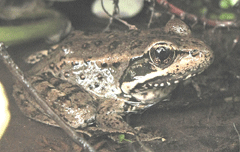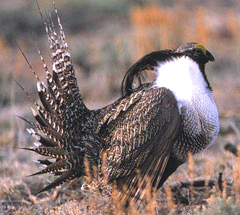Endangered Species Reconsidered
Air Date: Week of July 27, 2007

The California Red-Legged Frog. (Photo: Colin Brown
The U.S. Fish and Wildlife Service has announced it will review eight endangered species decisions that were overseen by former Interior Department official Julie MacDonald. Host Bruce Gellerman talks to Kieran Suckling, policy director for the Center for Biological Diversity, about how MacDonald used her power to reverse scientists’ recommendations.
Transcript
GELLERMAN: Mark Twain once quipped, “We have the best government money can buy, ” so we can well imagine what Twain would have thought about recent events at the Department of the Interior’s Fish and Wildlife Service and a frog made famous in one of Twain’s stories: “The Celebrated Jumping Frog of Calaveras County.” Last spring, Fish and Wildlife designated 450 thousand acres as critical habitat for the red-legged frog but that was nearly 40 percent less than the service’s own scientists had recommended. The Inspector General investigated, and found that Deputy Assistant Secretary of the Interior Julie MacDonald had twisted scientific evidence about the frog and other threatened species. The IG concluded MacDonald violated federal ethics rules. She leaked documents to industry lobbyists that could be used in lawsuits against the government.
Julie MacDonald resigned in May. Soon after, Lynn Scarlett, Deputy Secretary of the Interior, testified before Congress.
SCARLETT: Where there is evidence of science manipulation we will act upon it. I take that challenge and charge very seriously. You will find no greater champion of integrity in science than myself and this secretary.
GELLERMAN: Now, in what may be an unprecedented move Fish and Wildlife is going to review eight decisions that Julie MacDonald had influenced when she was working for the Department of the Interior. Kieran Suckling, Policy Director for the Center for Biological Diversity, has closely followed the endangered species cases and MacDonald's actions.
SUCKLING: Well, she would get these draft decisions to protect species or their habitat. And then she would personally go and just scratch out line by line numerous paragraphs and replace them with her own conclusions which were the exact opposite. She would find any whiff of scientific controversy and exaggerate that to say that the scientists don’t know what’s going on therefore the bureaucrats should over rule it. And she would just demand that they not reference important scientific studies at all if those studies would lead to protection of species.
GELLERMAN: Now, she wasn’t a scientist right?
SUCKLING: No, she was an engineer by training. And this is one of the things that I think infuriated the scientists so much was that in her rewriting of their text she just made a mish mash out of it, didn’t know what she was talking about and clearly just didn’t care. There was just no respect for the science at all.
GELLERMAN: Well, give me a specific example of how she might have used her influence to affect an animal that was being considered for the endangered species act.

The Gunnison Sage Grouse. (Courtesy of the California Bureau of Land Management)
SUCKLING: Well, the Gunnison Sage Grouse is a good example. This is a well-studied species. The scientists inside and outside of the agency all agreed it was very imperiled and should be put on the endangered species list. A proposal was sent up to Interior to put it on the list and MacDonald not only overruled the decision and kept it off the list, but at the same time she just ridiculed the scientists for what they were saying and just demonstrated this incredible hostility to the agency for trying to just simply do its job.
GELLERMAN: Now the Gunnison Sage Grouse isn’t one of the eight cases that’s going to be reviewed.
SUCKLING: That’s right and by our estimate there’s probably 100 endangered species decisions out there that she completely mangled that are not being reviewed either.
GELLERMAN: What could Julie MacDonald’s motive have been in keeping the Gunnison Sage Grouse off the endangered species list?
SUCKLING: Well, her motives were very clear. She was in constant contact with the livestock industry and also the oil and gas industry which is booming up in this portion of Colorado. And so she was very clearly working on their behalf to ensure that endangered species did not get in the way of them being able to trash thousands and thousands of acres of high desert habitat.
GELLERMAN: But don’t businesses have a right to legitimately express their interests to the government?
SUCKLING: Oh, absolutely. They have the right as any citizen does to participate in these public processes, submit comments, submit critiques. And if they don’t like the decision they can even file a lawsuit over it. But where MacDonald and industry crossed the line, was when they went outside the decision making process when they fudged the science and effectively lied and made a decision on political grounds instead of scientific grounds.

The California Red-Legged Frog.(Photo: Colin Brown)
SUCKLING: Mmm hmm yes.
GELLERMAN: There are 12 species of Hawaiian picture wing flies, and the southwestern willow flycatcher. Why would I care about the southwestern willow flycatcher?
SUCKLING: If you like clean water and rivers that function properly instead of flooding and destroying cities then you should like the southwestern willow flycatcher. It is a bell weather for healthy ecosystems. And by protecting it we’re protecting the water supplies that people from California to Texas require to survive. And we are protecting the foundation of life itself, and if that goes away we will certainly follow the flycatcher into extinction.
GELLERMAN: So, what happens now?
SUCKLING: Well, that’s a good question. The Administration has said they’re going to review these decisions. They, of course, were careful not to give a timeline. So I suspect that the first thing that will occur is environmentalists are actually going to sue over these decisions to make sure they actually get done. The Inspector General has opened a second investigation into MacDonald to determine whether she actually violated criminal conflict of interest laws. And so I think that we’re going to see this just grow and grow and get a glimpse of just how deep the corruption is in the Bush Administration’s Department of Interior.
GELLERMAN: Well, Kieren Suckling thank you very much.
SUCKLING: Glad to be here.
GELLERMAN: Kieran Suckling is policy director and founder of the Center for Biological Diversity.
[MUSIC: Stickmen Play “11th Hour” from ‘Polyphonic’ (Stickmen Play - 2003)]
Links
Living on Earth wants to hear from you!
Living on Earth
62 Calef Highway, Suite 212
Lee, NH 03861
Telephone: 617-287-4121
E-mail: comments@loe.org
Newsletter [Click here]
Donate to Living on Earth!
Living on Earth is an independent media program and relies entirely on contributions from listeners and institutions supporting public service. Please donate now to preserve an independent environmental voice.
NewsletterLiving on Earth offers a weekly delivery of the show's rundown to your mailbox. Sign up for our newsletter today!
 Sailors For The Sea: Be the change you want to sea.
Sailors For The Sea: Be the change you want to sea.
 The Grantham Foundation for the Protection of the Environment: Committed to protecting and improving the health of the global environment.
The Grantham Foundation for the Protection of the Environment: Committed to protecting and improving the health of the global environment.
 Contribute to Living on Earth and receive, as our gift to you, an archival print of one of Mark Seth Lender's extraordinary wildlife photographs. Follow the link to see Mark's current collection of photographs.
Contribute to Living on Earth and receive, as our gift to you, an archival print of one of Mark Seth Lender's extraordinary wildlife photographs. Follow the link to see Mark's current collection of photographs.
 Buy a signed copy of Mark Seth Lender's book Smeagull the Seagull & support Living on Earth
Buy a signed copy of Mark Seth Lender's book Smeagull the Seagull & support Living on Earth

